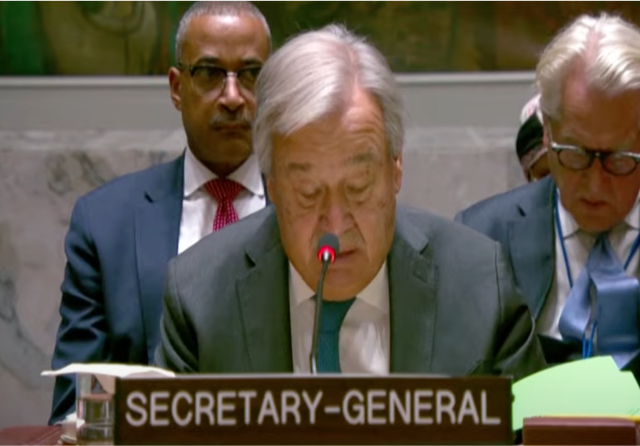Breaking News
Israel Bans UN Secretary General in Defiant Response to Iran Attacks

Source: YouTube
Israel has taken the unprecedented step of banning United Nations Secretary General António Guterres from entering the country, following his failure to explicitly condemn Iran’s missile attack on Israel. This decision, announced by Israeli Foreign Minister Israel Katz on October 2, 2024, comes amid rising tensions in the Middle East as Iran, Hezbollah, and Israel face off in a dangerous escalation of conflict. Katz declared that the UN Secretary General had not “unequivocally” condemned the attack, leading to this swift diplomatic action.
Israel's Frustration with the UN Secretary General
On October 1, Iran fired over 180 ballistic missiles at Israel, many of which were intercepted. Israel had anticipated a stronger response from the UN Secretary General, particularly a direct condemnation of Iran's actions. Instead, António Guterres issued a statement condemning the broader escalation of conflict in the region without naming Iran. This omission was the last straw for Israeli officials, who have long expressed dissatisfaction with the UN’s stance on Middle Eastern conflicts. Katz labeled Guterres as “persona non grata,” stating that “anyone who cannot unequivocally condemn Iran’s heinous attack on Israel does not deserve to set foot on Israeli soil.”
The United Nations, under the leadership of the UN Secretary General, has often played a key role in mediating the longstanding Israel-Palestinian conflict. However, Guterres has been criticized by Israeli officials for not condemning terrorist groups like Hamas and Hezbollah with the same vigor that he condemns Israeli military actions. This perceived bias has fueled Israeli frustrations, particularly as the UN Secretary General has repeatedly criticized Israel for its military campaigns in Gaza and the West Bank, while downplaying the threats posed by groups like Hezbollah.
Hezbollah’s Escalation and Iran’s Influence
The UN Secretary General’s response has been especially contentious in light of Hezbollah's growing role in the conflict. Hezbollah, a militant group backed by Iran, has a long history of hostility toward Israel, frequently launching cross-border attacks and maintaining significant influence in Lebanon. This connection to Iran makes Hezbollah a key player in the broader geopolitical tensions between Israel and its regional adversaries. After the recent death of Hezbollah’s Secretary-General Hassan Nasrallah, tensions escalated sharply, leading to Iran's unprecedented missile barrage aimed at Israel.
The death of Nasrallah not only inflamed Hezbollah’s supporters but also triggered immediate retaliation from Iran. Iran’s aggressive actions in response to this event were seen as a direct challenge to Israel's security, as well as a demonstration of Iran’s willingness to defend its proxies in the region. Israel, on the other hand, views Hezbollah as an extension of Iran’s military ambitions, and their presence along Israel’s northern border presents a constant threat. Iran’s influence over Hezbollah allows it to destabilize the region through indirect means, using Hezbollah as a tool to wage war without directly engaging with Israel on all fronts.
This complex relationship between Hezbollah and Iran is one of the major drivers of the broader conflict, with Israel often accusing both parties of escalating violence in the region. The UN Secretary General’s failure to condemn Iran’s missile attack in response to Hezbollah’s losses further complicates the situation. Guterres’ perceived reluctance to call out Iranian aggression reflects a broader issue within the UN when it comes to addressing state-sponsored terrorism, a concern Israel has raised repeatedly in international forums.
Global Reactions to Israel’s Ban of the UN Secretary General
The decision to ban the UN Secretary General has generated mixed reactions around the world. While some countries, including the United States, condemned Iran's missile attack on Israel and supported the country's right to defend itself, others expressed concern over the diplomatic implications of barring Guterres. Algeria, in particular, criticized Israel’s decision, calling it a sign of “disdain” for the international community.
Despite these reactions, Israel has stood firm. Katz reiterated that the UN Secretary General’s failure to explicitly condemn Iran’s role in the attack made his visit to Israel unacceptable. Israeli officials remain frustrated by what they view as the UN’s leniency toward terrorist organizations. Israel’s decision to ban Guterres is a clear sign of its growing frustration with the international community's handling of the conflict. The role of the UN Secretary General, particularly in mediating Middle Eastern disputes, has come under intense scrutiny, with Israel now questioning the UN’s impartiality. As the conflict escalates, this diplomatic fallout may have broader implications for the region, signaling a potential shift in Israel’s relations with the UN.
Do you agree with Israel in banning UN Secretary General Guterres from their country? Tell us what you think.
